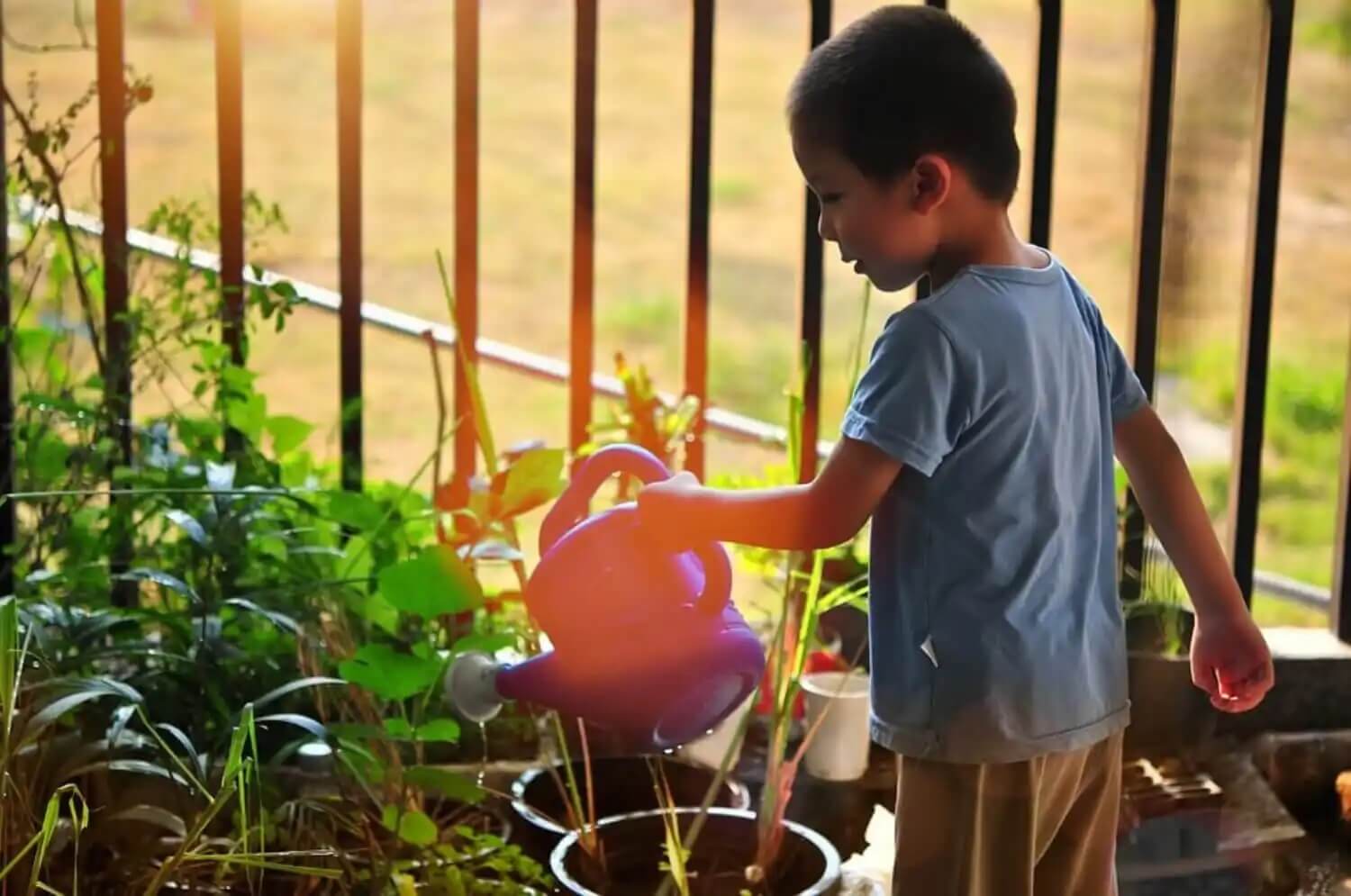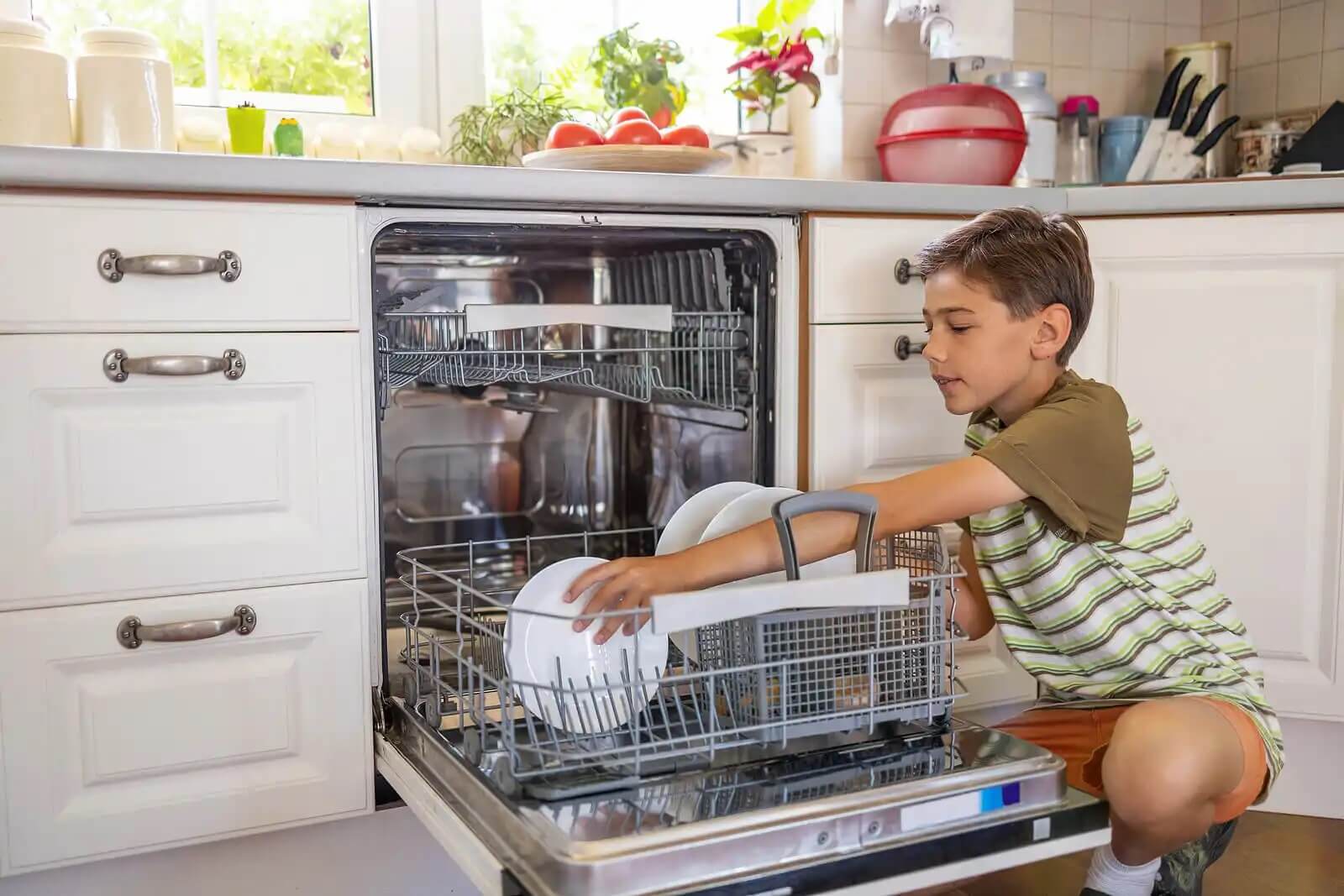Responsibility in Children: How to Encourage It?

Responsibility in childhood allows children to develop their personal autonomy. It implies having tasks or objectives and committing themselves to them, as well as becoming aware of the consequences of one’s actions. How can we increase responsibility in children according to their age?
In the following article, we’re going to talk about the development of personal autonomy and play, because they’re closely linked. We’ll look at the youngest children according to their age, from two to ten years old onwards.
In addition to this, we’ll propose some examples of tasks that you can assign them. We’ll also do this according to their age, in order to encourage their sense of responsibility.
Responsibility in children: how to encourage it?
Here are some ideas to work on responsibility in your children or students according to their age. Have a look and see what you think!
Responsibility in two to three-year-olds
According to experts, the tasks that children of these ages can and should perform must always be under the supervision of an adult. At two and three years of age, a child still doesn’t understand whether they’re doing things right or wrong. They act by either following orders or prohibitions. This means that, at these ages, they don’t have any self-control.
Examples of tasks to increase responsibility in very young children are putting away toys with the help of an adult, putting on pajamas, watering the flowers, and tidying away the napkins at the end of a meal.

Thre to four years old
As they’re a little older, the responsibilities that you can give children to increase their personal autonomy change slightly.
Between three and four years of age, children observe adults a lot and, above all, imitate their behavior. On the other hand, their interest in playing with other children is growing. In addition to this, at this age, they act according to the rewards (reinforcements) and punishments they can obtain or receive.
It’s an age when children can begin to do things for themselves, and keep their things tidy, for example. What tasks can you give them at this age? They can help to set the table, and you can encourage them to dress and undress themselves. You can also teach them to share things, and to wait for turns, put toys away independently, etc.
Responsibility in children aged four to five years
At this age, the child is still observing and imitating adults. However, they still need to be guided. The desire to please and help appears, and this can be favorable when it comes to choosing tasks to increase their responsibility.
In addition, thanks to this, the child will already show certain initiatives. These could be wanting to sleep alone, dress alone, play alone, and do some errands in the family setting…
Examples of tasks that can encourage responsibility in children of this age are letting them take care of their siblings (with the close presence of an adult), letting them tidy up the objects they use, and helping in the kitchen.
At this age, children are already beginning to be autonomous, both in their personal care (when dressing, showering…) and when it comes to eating.
In play, it’s an age when they begin to accept doing things in turns (even if they don’t always respect them) and they join together with two or three other children to play. It’s the age when the first friendships are established.
Responsibility in five to six-year-olds
At five and six years of age, children have usually already learned correct social behavior and social norms. However, they still need an adult to show them what they should and shouldn’t do. It’s good to offer them different possibilities so that they can choose between more than one option, as this favors their personal autonomy.
What tasks can you give them at this age? Simple household chores, such as clearing the table, cleaning, preparing their own clothes to get dressed and getting their bags ready for school etc. At this age, they usually like to help out and run errands. As for play, they play in groups of three or more children and follow simple rules.
Responsibility in children aged six to seven years old
At this age they can acquire more complex responsibilities. They can begin to prepare materials for school (and for any activity), and they can control themselves in very familiar and close environments or places such as school.
They can also begin to control some weekly pocket money, and may even have their own piggy bank where they put their savings. At six and seven years of age, they’re still guided by adults’ rules and habits and continue to identify what’s “right” with the orders given to them by adults, and what’s “wrong” by what they’re told not to do and on seeing that an adult gets angry.
Eight to nine years old
Personal autonomy begins to develop and children are able to control their impulses according to their intentions. They begin to become independent of their parents, and, as a result, seek their own personal interests.

To increase responsibility in children of this age, you can assign them tasks such as preparing breakfast, bathing themselves, helping in the kitchen, clearing the table, emptying the dishwasher etc. When they reach this age, you’ll need to show an attitude that will encourage initiative in them, while, at the same time, mixing your demands with flexibility.
Ten years and older
From this age, the tasks you can give them will become gradually more complex. They should already be able to take out the garbage, do simple shopping, cook a little in the kitchen (cooking pre-prepared dishes for example), sew buttons, and even take the family pet for a walk.
Conclusions
These are just a few ideas to encourage children’s responsibility, although, depending on the child’s characteristics and their development, these can easily change. As they grow up, they’ll become more and more independent and it’ll be necessary to adapt to this, adjusting, in turn, the responsibilities placed on them.
Like many other skills and values, responsibility can also be worked on. Knowing your children will help you to connect with their stage of development and capabilities, and to detect which tasks they’re capable of doing on their own and which ones still need supervision.
If questions arise, you can always turn to a specialized professional for guidance or turn to specialized books on the subject. There’s currently a lot of useful and attractive material, either in libraries or on the Internet.
Responsibility in childhood allows children to develop their personal autonomy. It implies having tasks or objectives and committing themselves to them, as well as becoming aware of the consequences of one’s actions. How can we increase responsibility in children according to their age?
In the following article, we’re going to talk about the development of personal autonomy and play, because they’re closely linked. We’ll look at the youngest children according to their age, from two to ten years old onwards.
In addition to this, we’ll propose some examples of tasks that you can assign them. We’ll also do this according to their age, in order to encourage their sense of responsibility.
Responsibility in children: how to encourage it?
Here are some ideas to work on responsibility in your children or students according to their age. Have a look and see what you think!
Responsibility in two to three-year-olds
According to experts, the tasks that children of these ages can and should perform must always be under the supervision of an adult. At two and three years of age, a child still doesn’t understand whether they’re doing things right or wrong. They act by either following orders or prohibitions. This means that, at these ages, they don’t have any self-control.
Examples of tasks to increase responsibility in very young children are putting away toys with the help of an adult, putting on pajamas, watering the flowers, and tidying away the napkins at the end of a meal.

Thre to four years old
As they’re a little older, the responsibilities that you can give children to increase their personal autonomy change slightly.
Between three and four years of age, children observe adults a lot and, above all, imitate their behavior. On the other hand, their interest in playing with other children is growing. In addition to this, at this age, they act according to the rewards (reinforcements) and punishments they can obtain or receive.
It’s an age when children can begin to do things for themselves, and keep their things tidy, for example. What tasks can you give them at this age? They can help to set the table, and you can encourage them to dress and undress themselves. You can also teach them to share things, and to wait for turns, put toys away independently, etc.
Responsibility in children aged four to five years
At this age, the child is still observing and imitating adults. However, they still need to be guided. The desire to please and help appears, and this can be favorable when it comes to choosing tasks to increase their responsibility.
In addition, thanks to this, the child will already show certain initiatives. These could be wanting to sleep alone, dress alone, play alone, and do some errands in the family setting…
Examples of tasks that can encourage responsibility in children of this age are letting them take care of their siblings (with the close presence of an adult), letting them tidy up the objects they use, and helping in the kitchen.
At this age, children are already beginning to be autonomous, both in their personal care (when dressing, showering…) and when it comes to eating.
In play, it’s an age when they begin to accept doing things in turns (even if they don’t always respect them) and they join together with two or three other children to play. It’s the age when the first friendships are established.
Responsibility in five to six-year-olds
At five and six years of age, children have usually already learned correct social behavior and social norms. However, they still need an adult to show them what they should and shouldn’t do. It’s good to offer them different possibilities so that they can choose between more than one option, as this favors their personal autonomy.
What tasks can you give them at this age? Simple household chores, such as clearing the table, cleaning, preparing their own clothes to get dressed and getting their bags ready for school etc. At this age, they usually like to help out and run errands. As for play, they play in groups of three or more children and follow simple rules.
Responsibility in children aged six to seven years old
At this age they can acquire more complex responsibilities. They can begin to prepare materials for school (and for any activity), and they can control themselves in very familiar and close environments or places such as school.
They can also begin to control some weekly pocket money, and may even have their own piggy bank where they put their savings. At six and seven years of age, they’re still guided by adults’ rules and habits and continue to identify what’s “right” with the orders given to them by adults, and what’s “wrong” by what they’re told not to do and on seeing that an adult gets angry.
Eight to nine years old
Personal autonomy begins to develop and children are able to control their impulses according to their intentions. They begin to become independent of their parents, and, as a result, seek their own personal interests.

To increase responsibility in children of this age, you can assign them tasks such as preparing breakfast, bathing themselves, helping in the kitchen, clearing the table, emptying the dishwasher etc. When they reach this age, you’ll need to show an attitude that will encourage initiative in them, while, at the same time, mixing your demands with flexibility.
Ten years and older
From this age, the tasks you can give them will become gradually more complex. They should already be able to take out the garbage, do simple shopping, cook a little in the kitchen (cooking pre-prepared dishes for example), sew buttons, and even take the family pet for a walk.
Conclusions
These are just a few ideas to encourage children’s responsibility, although, depending on the child’s characteristics and their development, these can easily change. As they grow up, they’ll become more and more independent and it’ll be necessary to adapt to this, adjusting, in turn, the responsibilities placed on them.
Like many other skills and values, responsibility can also be worked on. Knowing your children will help you to connect with their stage of development and capabilities, and to detect which tasks they’re capable of doing on their own and which ones still need supervision.
If questions arise, you can always turn to a specialized professional for guidance or turn to specialized books on the subject. There’s currently a lot of useful and attractive material, either in libraries or on the Internet.
All cited sources were thoroughly reviewed by our team to ensure their quality, reliability, currency, and validity. The bibliography of this article was considered reliable and of academic or scientific accuracy.
- Beltrán, J. y Bueno, J. A. (1995). Psicología de la Educación. Barcelona: Boixareu Universitaria.
- Garvey, C. (1985). El juego infantil. Madrid: Morata.
This text is provided for informational purposes only and does not replace consultation with a professional. If in doubt, consult your specialist.








